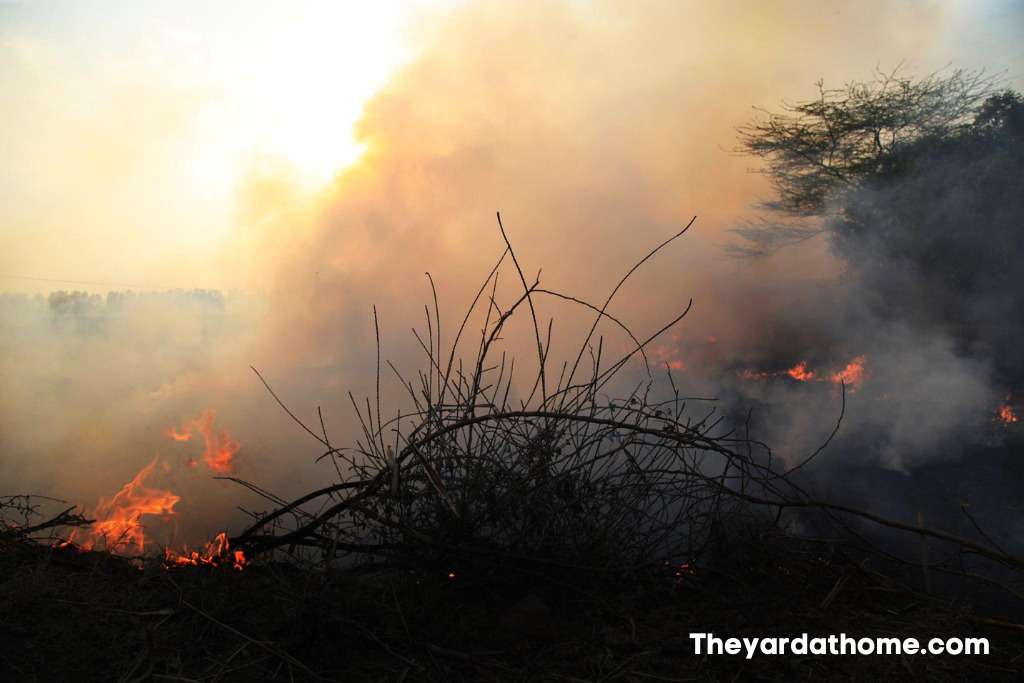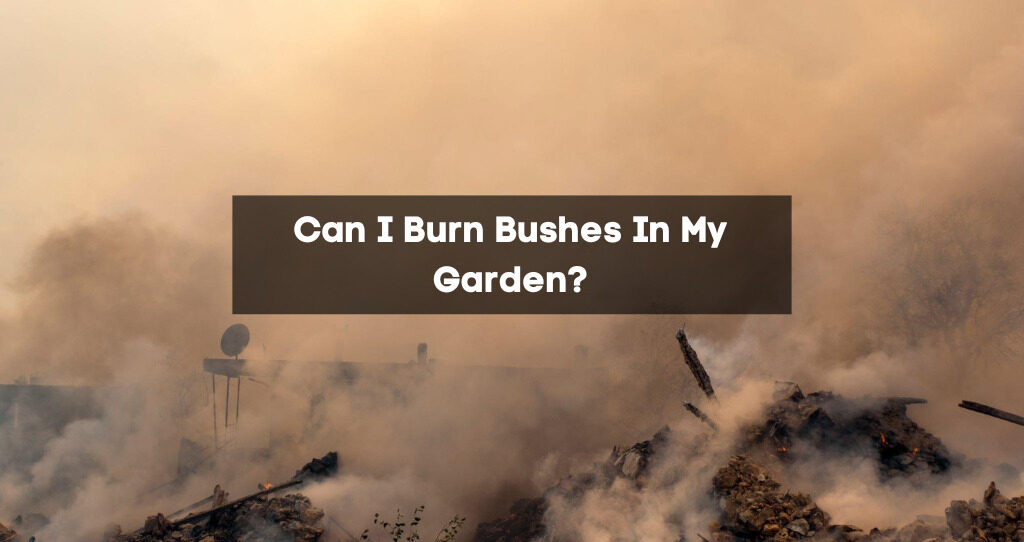It’s a common question that many homeowners ask themselves when they’re looking to clear their gardens. Burning bushes can effectively remove overgrown shrubs, but it’s not always the best solution.
So, what’s the answer? Can you burn bushes in your garden? The answer is more complex. Before you grab the matches and set fire to your garden waste, there are some essential things you need to consider.
Firstly, it’s vital to understand the consequences of burning bushes in your garden. Burning garden waste can produce harmful pollutants impacting human health and the environment.
Apart from the risks of accidents, fire can spread quickly and easily, endangering property, wildlife, and even people.
Moreover, in some areas, it is prohibited by law to burn garden waste as it can result in the nuisance of smoke that can cause health problems for people who are sensitive to particles in the air.
Can I Burn Bushes In My Garden?
No, burning bushes in your garden is not recommended. Burning bushes or any other plant material can be dangerous and harmful to both you and the environment.
Burning bushes can release harmful pollutants and chemicals into the air, which can cause respiratory problems and other health issues.
Additionally, burning bushes can also create a fire hazard, especially if the surrounding vegetation is dry and flammable.
It can quickly get out of control and pose a threat to neighboring properties.
1. Assess if burning is the best method for your property
If you are considering burning bushes in your garden to clear vegetation, several factors need to be considered before proceeding. The first step is to assess if burning is the best method for your property.
Factors to consider in this assessment include local and state regulations, weather conditions, and the size and location of the subject vegetation.
Burning is highly regulated or banned in many areas, so it is essential to check with your local authorities before proceeding.
Additionally, weather conditions such as wind speed and direction are critical factors, as high winds can cause a fire to spread quickly and unpredictably.
Finally, the location and size of the vegetation must be considered, as there may be better options than clearing large or densely populated areas by burning.
2. Determine if burning poses a safety risk to surrounding areas
If you are considering burning bushes in your garden, one important factor is whether it poses a safety risk to surrounding areas. Before burning, it is crucial to evaluate hazards such as wind direction or dry weather conditions that may increase the wildfire risk.
Burning materials in high winds or during drought conditions can quickly escalate into a dangerous situation, endangering your property and nearby lands.
It’s also essential to check local regulations and obtain necessary permits before starting any fire.
Taking these precautions ensures that any burning activity is safe and controlled, minimizing potential hazards to surrounding areas.
3. Acquire any necessary permits before burning
If you are considering burning bushes in your garden, taking the necessary steps beforehand is essential to ensure that the burn is done safely and legally. One of the critical steps to take is to acquire any necessary permits before burning.
The regulations regarding open burning can vary significantly depending on your location, so it is essential to research and follow the laws and regulations for your area.
Failing to acquire proper permits can result in fines and other legal repercussions.
Additionally, obtaining permits can help ensure you burn under safe weather conditions and properly dispose of any debris afterwards. Be sure to contact your local fire department or environmental agency for information on obtaining the necessary permits for burning bushes in your garden.
4. Familiarize yourself with local regulations regarding burning
When it comes to burning bushes in your garden, it is essential to familiarize yourself with the local regulations regarding burning.
Regulations can vary depending on your location and can include restrictions on the type of materials that can be burned, the size of the burn pile, and the times of the year when burning is allowed.
Some areas may require permits or have specific guidelines for safe burning practices. It is crucial to follow these regulations for your safety and the safety of those around you. Failure to comply with local laws can result in fines or other legal consequences.
Before attempting any burning in your garden, check with your local government agencies to ensure you follow all applicable regulations.
5. Ensure that you take the necessary precautions to prevent uncontrolled burning
When considering burning bushes in your garden, taking the necessary precautions to prevent uncontrolled burning is essential. This ensures that the fire does not spread beyond the designated area and causes property damage or even harm to individuals:
- Ensure the area around the burn site is clear of flammable material such as dry leaves, twigs, or other debris.
- Ensure the weather conditions are favourable, with low wind speeds, moderate humidity levels, and no active fire bans in the area.
- Have appropriate fire extinguishing equipment, such as a hose or fire extinguisher, readily available.
- Never leave the fire unattended, and always have someone present to monitor it until the flames have entirely died down.
Following these necessary precautions ensures that your burning activities are carried out safely and responsibly.

6. Confirm the type of material that is being burned
Before burning any bushes, it is essential to confirm the type of material that is being burned. When burned, certain types of bushes and shrubs may release harmful toxins, which can lead to serious health issues.
Additionally, burning certain plants may release toxic chemicals into the air that can cause environmental pollution. Therefore, it is highly recommended to research and identify the bush or plant material type before starting a garden burn.
Generally, it is best to burn dry woody material or untreated wood logs that are thoroughly dried and do not contain any chemicals or toxins. If you have any doubts about the safety of burning specific plant material, it is always advisable to seek professional advice from a licensed arborist or fire department.
7. Take necessary steps to dispose of ashes effectively
When burning bushes in your garden, taking the necessary steps to dispose of ashes effectively is essential. One of the primary concerns when disposing of ashes is preventing fires from occurring.
Ashes can remain hot for several hours after the fire has burned out, and hot ashes can ignite new fires if they are not correctly disposed of. To minimize the risk of fire, it is recommended to thoroughly soak the ashes with water before disposing of them.
Additionally, ashes should be disposed of in metal containers with tight-fitting lids or buried in a pit away from combustible materials, such as flammable bushes or plants.
It is also essential to never dispose of ashes in plastic bags or containers, as the heat from the ashes can quickly melt through the plastic, potentially causing a fire. You can safely and effectively dispose of ashes from burning bushes in your garden by taking these necessary steps.
8. Monitor the fire at all times to ensure it does not get out of control
When considering whether you can burn bushes in your garden, taking safety precautions seriously is essential. One of the most critical safety measures is constantly monitoring the fire to ensure it does not get out of control.
Even if you have experience with small fires, it’s essential to keep a close eye on flames and embers to prevent them from spreading, especially if it’s a windy day or if the surrounding vegetation is dry.
In addition, it’s crucial to have a water source nearby, whether a hose or buckets of water, to extinguish the fire, if necessary, rapidly. Remember that a backyard burn can turn disastrous if safety measures are not followed closely.
Conclusion
In conclusion, burning bushes in your garden may seem like a quick and easy solution to clearing unwanted foliage, but it is generally not recommended due to the risks involved.
Instead, consider alternative methods like pruning, composting, or using natural weed killers.
It is important to research local regulations and guidelines and keep safety measures in mind before attempting to burn any plant material in your garden. Finding the proper method for your gardening needs will help keep you and your garden safe and healthy.

